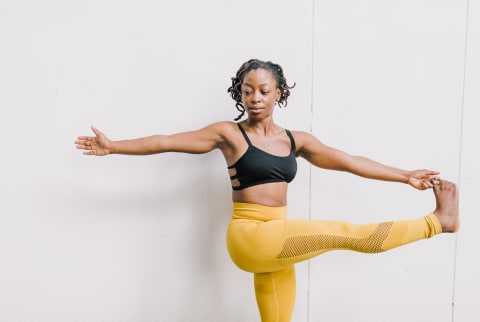How Yoga May Ease Depressive Symptoms & Support Mental Health


Whether you're a fitness fanatic or have a let's get this over with attitude toward exercise, it's hard to deny the benefits of working out. Yoga is no exception—research shows it can improve flexibility, reduce chronic pain1, and even help you sleep better. It may also have powerful mental benefits, according to new research from the University of South Australia.
The review, published in the British Journal of Sports Medicine, analyzed 19 studies from six different countries to see how yoga affects people with mental health disorders2.
What did the researchers find?
The studies included 1,080 participants over 18 years old. Each had been diagnosed with at least one mental disorder, including depression, anxiety, post-traumatic stress, and panic disorders.
Yoga was defined in the study as a mind-body practice, combining breathwork, movement, and mindfulness. Regularly practicing yoga appeared to have greater effects on depressive symptoms than no treatment or a patient's usual treatment.
While all types of yoga were beneficial, movement yoga—which required participants to hold poses or flow through movements—seemed to have the greatest impact.
Weekly sessions of yoga lasted between 20 and 90 minutes, for a little more than two months. Data found participants' mood was affected based on the dose of movement. In other words, the more frequently and prolonged the practice, the greater the effects.
"Our research shows that movement-based yoga improved symptoms of depression (or improved mental health) for people living with a range of mental health conditions including anxiety, post-traumatic stress, and major depression," lead researcher and Ph.D. candidate Jacinta Brinsley said in a news release.
Bottom line.
While the analyzed studies were large and diverse, there are still limitations. The review says there's not enough data to understand which type of yoga interventions are most helpful. On one hand, movement yoga may be more closely associated with aerobic exercise, which has known effects on mood. Other studies, however, suggest the slow practice of Iyengar yoga can improve depression and anxiety.
Either way, associate professor Simon Rosenbaum, Ph.D., says the results show "you don't necessarily need to go for a jog to benefit from movement."

Abby Moore is an editorial operations manager at mindbodygreen. She earned a B.A. in Journalism from The University of Texas at Austin and has previously written for Tribeza magazine. She has covered topics ranging from regenerative agriculture to celebrity entrepreneurship. Moore worked on the copywriting and marketing team at Siete Family Foods before moving to New York.